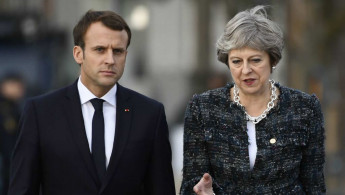Theresa May defends Syria strikes in Commons showdown
May addressed MPs on Monday afternoon and staunchly defended her decision to proceed with the joint strikes without prior parliamentary approval, an issue of particular sensitivity in the UK where memories of participation in the US-led invasion of Iraq in 2003 are still raw.
May called the situation in Syria "a stain on our humanity" and stressed that the humanitarian situation made it "morally and legally right" to take action, as diplomatic efforts had been "repeatedly thwarted" and that diplomacy would not work on its own.
The British leader also outlined evidence that the Russian-backed Syrian regime had carried out the chemical attacks, and were now attempting to conceal evidence of what had happened and prevent the UN-affiliated chemical weapons watchdog from investigating. This, according to May, justified the need to act quickly and without parliamentary consent.
Jeremy Corbyn, leader of the main opposition Labour Party, has said the strikes were "legally questionable" and called for new legislation to stop governments launching military action without lawmakers' backing in most circumstances.
"I believe that parliament should have been consulted and voted on the matter. The UK prime minister is accountable to parliament, not to the whims of a US president," he wrote in a weekend letter to May and reiterated in the House of Commons on Monday.
He said in a response to May's statement that the BBC reported the attacks took place at the weekend because May wanted them to happen while parliament was still in recess.
Twitter Post
|
Corbyn also called on May to abandon support for the Saudi bombing campaign in Yemen, and cancel arms sales to Saudi Arabia, as the humanitarian situation there - widely considered the worst humanitarian crisis in the world - would also justify military action by her logic.
Corbyn also refuted May's claim that diplomatic action did not work, as such talks had led to the destruction of 600 tonnes worth of Syria's chemical weapons stockpile in 2013.
The leftwing leader also called on May to take in more child refugees from Syria.
When asked what would happen in the event of further chemical attacks, May said she would be willing to order further airstrikes against Syria, refusing to commit to consulting parliament beforehand.
Stop the War, a coalition once chaired by Corbyn, held a demonstration outside parliament on Monday afternoon.
The group said the strikes "will have done nothing to end the war" and "risked dramatically widening" the conflict.
The leaders of the opposition Scottish National Party and Liberal Democrats have also criticised May and there is the possibility of a vote in parliament later Monday that could embarrass the prime minister if she loses.
'Humanitarian' intervention
Ahead of May's speech in parliament, Foreign Secretary Boris Johnson on Monday said the strikes were "right for the UK and right for the world" ahead of talks with EU foreign ministers.
"It was the world saying that we have had enough of the use of chemical weapons, the erosion of that taboo that has been in place for 100 years has gone too far under (Syrian President) Bashar al-Assad," he said.
But a poll showed scant public support for the move, unconvinced that such action is just, and would affect real change in the seven-year-long conflict.
The poll by Survation for the Mail on Sunday showed 36 percent in favour of Britain's participation in the air strikes, 40 percent against and the remainder undecided.
Out of the 2,060 respondents in the survey, 54 percent also agreed with the statement that May "should have held a parliamentary debate and vote before intervening militarily in Syria".
The strikes, carried out alongside the United States, mark May's first major military action since coming to power almost two years ago.
Agencies contributed to this report.





 Follow the Middle East's top stories in English at The New Arab on Google News
Follow the Middle East's top stories in English at The New Arab on Google News


